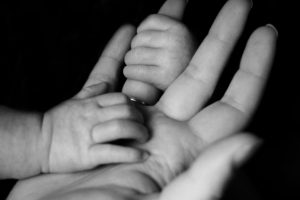 Having a baby can bring immense happiness and joy into your life, but for many it can also bring about unpleasant and never-experienced-before emotions. Several days postpartum and the majority of us will experience an emotional rollercoaster. Thrilling moments of joy and happiness which are abruptly and very unexpectedly disrupted by the baby blues. If any of these symptoms described below seem familiar it might not necessarily mean that you have postnatal depression. Fact is, many women experience mild depression after giving birth lasting between a few days to a week. This is considered to be a normal biological reaction, in which the hormones progesterone and estrogen plummet to normal levels after delivery. This rapid change in hormonal levels triggers postpartum blues for as many as 70% of women. Whilst most women start to feel like themselves once the baby blues disappear, 20% of women continue to experience symptoms but in a more severe form.
Having a baby can bring immense happiness and joy into your life, but for many it can also bring about unpleasant and never-experienced-before emotions. Several days postpartum and the majority of us will experience an emotional rollercoaster. Thrilling moments of joy and happiness which are abruptly and very unexpectedly disrupted by the baby blues. If any of these symptoms described below seem familiar it might not necessarily mean that you have postnatal depression. Fact is, many women experience mild depression after giving birth lasting between a few days to a week. This is considered to be a normal biological reaction, in which the hormones progesterone and estrogen plummet to normal levels after delivery. This rapid change in hormonal levels triggers postpartum blues for as many as 70% of women. Whilst most women start to feel like themselves once the baby blues disappear, 20% of women continue to experience symptoms but in a more severe form.
This is where the confusion can begin, where symptoms such as exhaustion, isolation, endless feelings of guilt, obsessive thoughts about the babys’ health seem convincing enough to make us believe that this is in fact all part of motherhood.
The New Baby
Symptoms aside, let’s talk about the baby. Just one big need-machine, who needs you to be at the ready to feed, change, clean, cuddle whenever he demands. All you wish and beg for in return is eye contact or even a smile, ok just once tiny glance please? Until you remind yourself you’re asking for too much.
The Lack of Rewards
You expected motherhood to be rewarding and full of joy yet you feel the complete opposite. Then comes resentment towards the baby for how she/he has changed everything, like E.V.E.R.Y.T.H.I.N.G. In the attempt to fully embrace the fact that life is never going to be the same, you remind yourself of the decision-making process you and your partner went through. Whilst this does not convince you that you made the right choice, you continue to accept everything that comes with being a new parent.
Bouncing Back
Your whole life revolves around this little being who has occupied your every minute of everyday. So it probably comes to no surprise that you’ve lost complete track of what day it is, whilst minutes drag in to hours, days, weeks (and before you know it – months) you question does it really even matter what day of the week it is? Then comes the long awaited day of returning to work, an opportunity to break free from the everyday stresses of caring for a baby. But that doesn’t come easy either, with your colleagues throwing constant reminders that you don’t seem like yourself. You politely get reminded daily by family, friends and now even colleagues that you don’t seem to have bounced back. But this is how everyone feels postpartum right? Or am i missing something?
Symptoms
Approximately 15% of women experience postnatal depressive symptoms, occurring anytime within the baby’s first year. Some or all of the following symptoms may be experienced:
- a persistent feeling of sadness and low mood
- feeling agitated or irritable
- intense feelings of guilt and hopelessness
- frequent tearfulness
- loss of appetite
- insomnia
- obsessive thoughts about the babys’ health
- loss of interest in pleasurable activities
- constant feelings of inadequacy and worthlessness
- isolation
- difficulty concentrating
- lack of motivation and energy
- difficulty bonding with baby
- suicidal thoughts
- fear of harming the baby (very rarely acted upon)
Am I At Risk?
While many women struggle to cope with endless sleepless nights and an overly demanding baby, postnatal depression is diagnosed based on its intensity and severity.
Mothers experiencing postnatal depression don’t just feel anxious caring for their newborn, they feel utterly inadequate and hopeless meeting the demands of their baby. Its not only the mental and physical exhaustion but also the complete drainage of energy which isn’t even restored when they do sleep. The worries related to the baby turn into obsessive thoughts about the childs’ health. Maybe there is something seriously wrong with the baby?
It is difficult to determine the exact cause of postnatal depression, however recent research has been able to identify the potential risk factors, these include: history of depression or anxiety (including antenatal depression), stressful life events, poor social support, complicated pregnancy or traumatic childbirth.
Seek Help
Sadly, many women feel tremendous shame for not being able to experience the joy of having a baby which can often worsen certain symptoms, especially feelings of guilt and hopelessness. If left untreated, you are placing yourself at risk of developing another and a possible longer episode of depression which could have serious consequences on your mental health.
If you find yourself relating to some of the above, it is critical that you get the support you and your baby need in order to fully enjoy motherhood.
